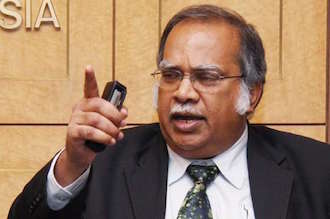Umno’s hegemony is about material rewards

Since Umno is still very much entrenched in power and state institutions are often invoked to maintain this power , it has become extremely difficult to dislodge the party.
P Ramasamy, Free Malaysia Today
Although I agree with Mukhriz Mahathir that race and religion might be the reason why Umno members are not willing to abandon Najib Razak, there are other equally compelling factors as well.
What pulls Umno together at the end of the day on the basis of race and religion is the material rewards in the form of cash handouts, business contracts, licenses among others. While Malays might have joined Umno to safeguard race and religion, what holds them together is the prospect of these financial rewards.
This would explain why some key Umno personnel are still not affected or concerned about the colossal corruption and misappropriation of public funds from 1MDB. Given this rampant corruption and the possible involvement of none other than the Prime Minister Najib Razak, Umno members, still have not taken the painful decision to abandon the “Najib ship”.
Race and religion cannot be seen in isolation. Economic benefits are tied inextricably with the need to maintain and perpetuate Malay-Islamic hegemony. There are no political alternatives to Umno to take up the issue of Malay hegemony; PAS is a poor example.
I am not saying that members will forever be indebted or loyal to Umno. As it is political support for Umno is declining fast. But it has not reached a point where the very existence of Umno is threatened. Over the years, Umno has lost thousands of members to PAS, PKR and other Malay-Islamic political parties.
Since Umno is still very much entrenched in power and state institutions are often invoked to maintain it, it has become extremely difficult to dislodge the party. Its leaders might be corrupt and might be seen to abuse power, but the fact that race, religion and economic benefits are all enmeshed in the larger configuration of things, Umno remains relevant to its members at least for the moment.
Let us not forget that it is not Najib alone who benefitted from the funds that flowed into this accounts, but many others who subsequently became the beneficiaries. There is fear if Najib has to go, the heads of many other Umno leaders will also roll.
The necessity to maintain Umno intact is not the sole responsibility of Najib alone. Umno leaders who have worked closely and defended Najib have a stake in the political system. They are not about to ditch the party, unless of course, something drastic happens. Hundreds of thousands of Umno members throughout the country might not know the complexity of the corruption and the way funds were siphoned from 1MDB, but many, only exposed to the mainstream mass media, still harbour the thought that Najib might be the victim of foreign forces.
Race and religion might be open manifestation of leaders and members for the continuation of Umno to prolong its stay, but beneath these ascriptive items are complex forces, away from the naked eyes, that provide sustenance to a political party, that is considered a corrupt one.
As the Italian Antonio Gramsci said in the 1930s, a frontal battle might not work in particular instances, what is needed is a battle to change the minds of the people. It was in this context, that he introduced the idea of hegemony, in other words, a hegemonic battle had to be fought to transform the cultural and political leanings of the people.
Maybe thinking along the lines of Gramsci might be instructive to think of ways and means to undermine the very existence of racial political parties.
P Ramasamy is Penang’s Deputy Chief Minister II.

